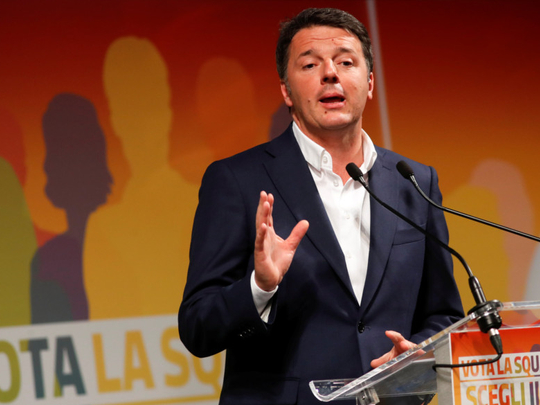
Just when most of us thought we knew all the jargon that Brussels could muster, along comes an agreement that’s going to be very relevant in the coming months — the ‘Fiscal Compact Stability and Growth Pact’.
In a nutshell, the fiscal pact was the European Union’s (EU) attempt to get to grips with the fallout of the 2008 financial crisis and turmoil in the 19 nations that use the euro as a common currency. Since unbridled debt got the Eurozone into the crisis, the fiscal pact was Brussels’ way of turning up pressure on governments by limiting their ability to be in deficit and to work towards specific spending targets.
Sounds like common sense? Yes. Except when it comes to Italy.
Frankly, while Italy’s recent economic figures are good — unemployment remains at a stubborn rate of 11 per cent, or around 35 per cent for those aged between 18 and 24 — it’s debt level is huge. If the average level is 90 per cent — Estonia has the lowest at 10 per cent — Italy is at 134 per cent.
In a little more than three weeks’ time, on March 4, Italians will head to the polls to elect a new national government. All the polls suggest the nation is most likely heading for a hung parliament with no single party able to rule by itself, but all the parties are campaigning on reforming that fiscal pact with the EU Commission.
Take Matteo Renzi, the leader of the ruling Democratic Party. He wants to negotiate the fiscal pact, allowing him to raise Italy’s budget deficit by a further 3 per cent for five years to cut tax levels and increase investment. He’s offering continuity in Italy’s social and foreign policy, with Rome continuing its long-standing support for the North Atlantic Treaty Organisation (Nato). Opinion polls show the Democrats are sliding, at about 23 per cent support.
It’s not as if the anti-establishment 5-Star Movement is doing any better. Its leader, 31-year-old Luigi Di Malo, is campaigning to ensure a monthly income of €780 (Dh3,550) for all, to renegotiate the fiscal compact and raise Italy’s deficit to cut taxes and increase investment. If the EU doesn’t make concessions, Di Malo is promising a referendum on continued membership of the euro. The party also wants to roll back labour reforms and raise company taxes on big corporations. Polls put 5-Star support at around 38 per cent.
And then there are the centre-right parties, the biggest being Forza Italia, led by the colourful former prime minister, and media magnate, Silvio Berlusconi, now 81. He wants to introduce a parallel currency just for Italian domestic use while retaining the euro for tourists to use in Italy and for its dealings internationally. Berlusconi wants a €1,000 minimum monthly income for all and promises to simplify Italy’s tax rates. Then he’ll abolish things like inheritance and car taxes and give tax breaks to pet owners. Last Sunday, he pledged to deport 600,000 illegal immigrants from Italy as tension simmered over the shooting of six Africans by a far-right extremist the day before.
But there’s a small matter of a fraud conviction that means Berlusconi can’t lead Italy again, but he has refused to say who will be his nomination for premier. Forza’s support is rising, now at 16 per cent, and it and its right-wing allies are expected to win most seats come March 4.
Bringing in the alternative currency is Berlusconi’s way around that fiscal pact — and Brussels still holds him responsible for chaos in the Eurozone during the height of the crisis.
Forza has an alliance with two smaller regional parties, the Northern League and the Brothers of Italy.
Matteo Salvina, head of the Northern League, favours the dual currency scenario and wants the fiscal pact abolished. He also wants out of the euro and his party is holding at 13 per cent in opinion polls.
Then there’s Giorgio Meloni, who leads the Brothers of Italy. She wants to send all immigrants packing, wants refugee boats turned back in the Mediterranean, and supports closer ties with Russia. Its support is stable at 5 per cent, and the 41-year-old leader is being touted as a possible prime minister, working alongside the disbarred Berlusconi.
The Brothers of Italy trace its roots back to the post-Fascist Italian Social Movement. Meloni, the only women to lead a party in the election, wants Italians to have more babies. “The first thing we asked for was a grand plan to sustain the birth rate and give incentives to become parents, which is a priority in our programme,” she said. “Too many women have to choose between being a mother and having a job.”
Meloni says that if Italy’s birth rate keeps on falling, in 30 years, more than 35 per cent of the population will be over 65 and the welfare system that underpins the Eurozone’s third-largest economy will not cope. Since becoming Italy’s youngest ever minister 10 years ago, Meloni has campaigned on a hard-right, nationalist platform with the credo “Italians First”. She’s also popular, and her quick-wit and hard-hitting comments make her a formidable adversary.
As well as the parenting plan, which includes monthly bonuses for parents of children under six, Brothers of Italy wants Muslim religious services to be conducted in Italian not Arabic, and to limit the number of foreign pupils in schoolrooms.
Free and Equal, a left-wing party led by 72-year-old Piero Grasso is touting labour and pension reforms, fully recognising Palestine, and increasing ties with Russia. It also wants higher taxes on wealthy Italians and wants to invest in infrastructure and public works projects. It’s at 7 per cent.
With the campaigning well and truly underway, and with the fiscal pact a central part of the debate, the reality is that’s there is no appetite in Brussels, in Berlin or in Paris, to open the terms of the fiscal pact.
None. Nada. Zip.








